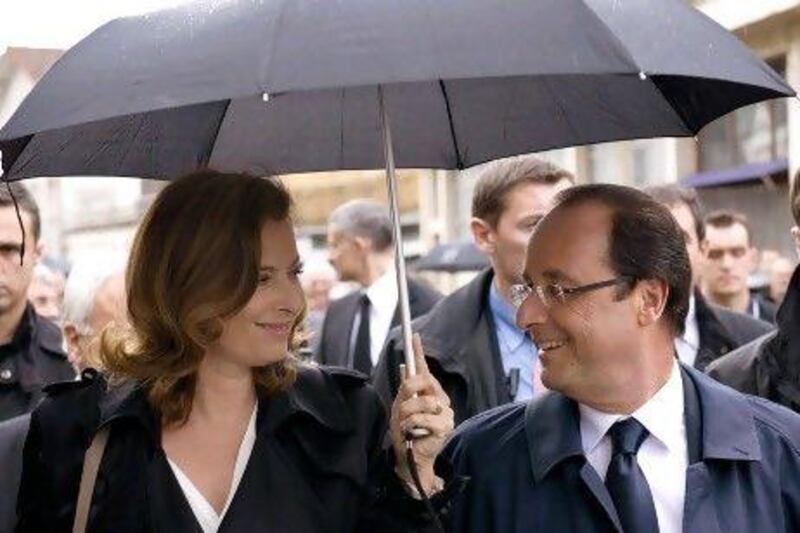MARSEILLE // An explosive electoral intervention by France's "first lady" has caused embarrassment to the new president, François Hollande, and intensified national debate on the roles and responsibilities of political leaders' partners.
Valerie Trierweiler, a political journalist, used her Twitter account to send encouragement to a rebel candidate threatening the parliamentary career of a prominent fellow socialist, Ségolène Royal.
The gesture brought an avalanche of criticism from politicians and the media - not least because Ms Royal, beaten by Nicolas Sarkozy in the 2007 presidential elections, is Mr Hollande's former partner and the mother of their four children.
Ms Trierweiler, 47, timed her tweet to coincide with a mission led by a socialist heavyweight, Martine Aubry, intended to boost Ms Royal's chances of warding off a challenge for a seat in the national assembly from a party dissident, Olivier Falorni.
Ms Royal, 58, topped the poll in the Atlantic coastal constituency of Charente-Maritime, but only narrowly ahead of Mr Falorni, a popular local party member.
The battle on her behalf is portrayed in France as Saving Soldier Royal, a play on the title of Steven Spielberg's Second World War epic Saving Private Ryan.
The tweet from Ms Trierweiler, who had 75,000 Twitter followers before the controversy and now has 95,000, read: "Courage: you have proved your worthiness and have fought selflessly [for people in the constituency] for so many years."
Mr Falorni welcomed it as a warm and flattering personal message. Ms Royal declined to comment but spoke generally of having to endure "contempt and personal attacks" during the campaign.
It may be that the episode says more about Mr Hollande's private life than his presidency. It is said Ms Trierweiler dislikes the president's former long-term partner but the confusion of personal feelings and politics is potentially damaging.
The French political establishment was already agonising over "dangerous liaisons" between top politicians and partners who happen to be well-known journalists.
Ms Trierweiler was a political writer for the weekly magazine Paris-Match, which thrives on disclosure. She was adamant about her right to return to work after Mr Hollande's victory on May 6, her only concession being a switch from political to cultural affairs.
Given her experience, it seems inconceivable that she did not realise her tweet would unleash political controversy or, indeed, that it would prove deeply uncomfortable for the president. His prime minister, Jean-Marc Ayrault, felt obliged to move swiftly to reaffirm the president's support for Ms Royal.
One of the president's political confidants, François Rebsame, mayor of the Burgundy city of Dijon, told France-Info radio Ms Trierweiler had exceeded her proper role: "It was a personal message reflecting personal considerations … [but] she must learn the need for restraint.
"We now have a president committed to keeping private and public lives separate; they became too confused under Nicolas Sarkozy."
The message was repeated later by the prime minister, aware the tweet was seen as an equivalent of Mr Sarkozy's then wife, Cecilia, failing to vote for her husband in the presidential run-off in 2007, when their marriage was in trouble.
Mr Sarkozy's current wife, Carla Bruni-Sarkozy, recorded an album and acted in a Woody Allen film, Midnight in Paris, during her husband's presidency but generally conducted herself, in public pronouncements, with discretion. The debate over the partners of senior political figures extends beyond the Elysée.
One radio station, France Inter, cancelled a current affairs programme fronted by Audrey Pulvar, the partner of Arnaud Montebourg, who as minister for industrial recovery is among the key members of the Hollande cabinet. However, she will continue to appear on other radio and television programmes.
Partners of the labour and education ministers, Michael Sapin and Vincent Peillon, are journalists too.
The French journalists' trade union has called on members to avoid suspicion of conflicts of interest by distancing themselves from professional duties that may involve their personal relationships.
But it is hardly a new phenomenon. Mr Sarkozy had a relationship with a political journalist and the most famous political/media coupling is Dominique Strauss-Kahn and Anne Sinclair. Ms Sinclair stopped hosting a political programme when he became finance minister in 1997 and returned to journalism only after the New York sex scandal forced her husband out of this year's presidential contest.
Most commentators and voters responding to broadcast discussions have spoken with disapproval of Ms Trierweiler's actions.
She retains her admirers, however, from the radio phone-in caller who said she was entitled in a modern age to express her views to those who credit her with rescuing Mr Hollande, 57, from an unhappy relationship and transforming him into the leaner, sharper politician who and won against Mr Sarkozy.
Mr Hollande's officials, initially stunned when learning of the tweet, were arguing yesterday that it was not meant as an attack on Ms Royal.
Ms Trierweiler told one journalist she was unrepentant and that onslaught was unfair because Mr Falorni was among Mr Hollande's most solid supporters.







